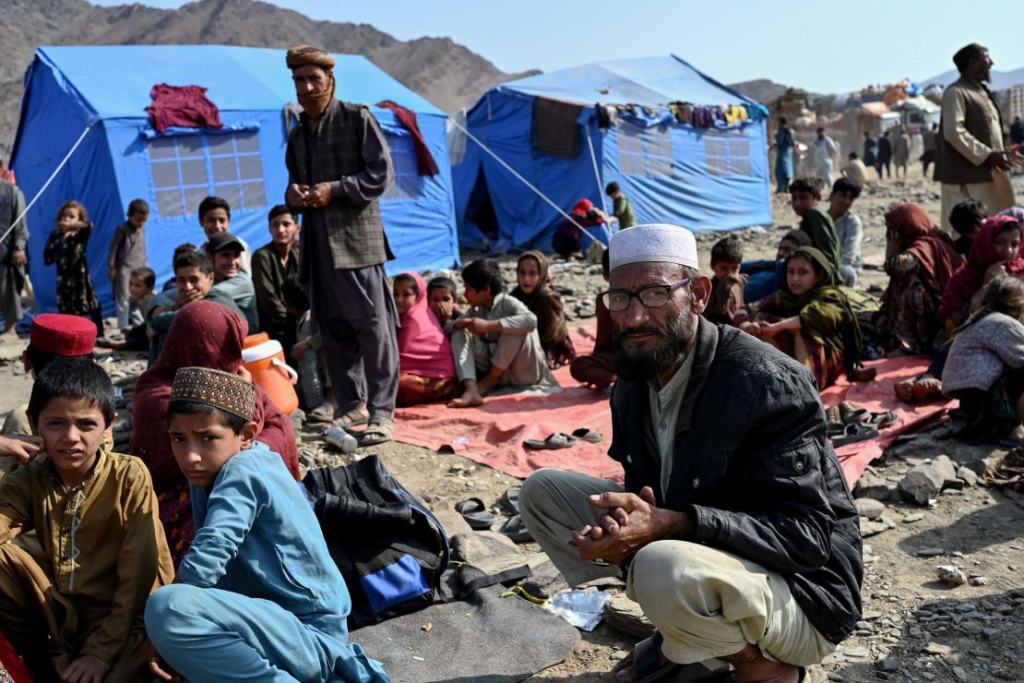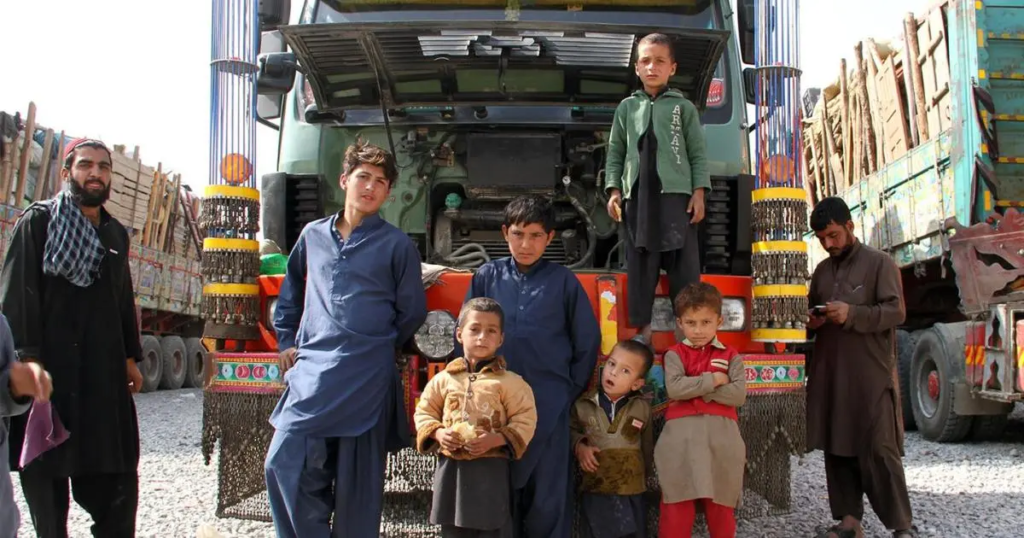The Ministry of Refugees and Repatriations of the Taliban has announced the release and return of 42 Afghan migrants who had been detained in Pakistan’s Haji Camp prison.
This move comes amid the increasing arrest and deportation of Afghan refugees from Pakistan and Iran, raising serious concerns among international human rights organizations.
These deportations have further exacerbated Afghanistan’s ongoing humanitarian crisis, leaving thousands vulnerable in a country struggling with economic collapse and harsh winter conditions.
The plight of Afghan migrants in Pakistan and Iran continues to be a pressing issue, with calls from international bodies urging the host nations to adopt more humane policies.
Detention of Afghan Migrants in Pakistan
The Afghan refugees released from Pakistan’s Haji Camp prison had been detained for periods ranging from two to five months. According to the Taliban’s Ministry of Refugees and Repatriations, these individuals, including women and children, were arrested due to their lack of legal documentation.
The detentions primarily took place in Islamabad, Pakistan’s capital, where undocumented Afghan migrants have been subjected to frequent arrests in recent months.
Pakistan has witnessed a growing number of Afghan refugees crossing into its territory since the Taliban’s return to power in August 2021. Many of these individuals fled Afghanistan fearing persecution, violence, or economic hardship.
However, Pakistan has increasingly tightened its policies on undocumented migrants, leading to mass arrests and deportations. The Pakistani government cites national security concerns and the burden on its economy as reasons for these actions.
Reports indicate that by December 31, 2023, Pakistan’s security forces had detained approximately 31,000 Afghan migrants. Many of these individuals have been kept in facilities such as the Haji Camp prison, awaiting deportation or release through diplomatic negotiations.
Read : Taliban Suspends Afghanistan’s Only Women Radio Station ‘Begum FM’
Over the past year, more than 4,268 Afghan migrants, including women and children, have been released from jails in Sindh Province alone and subsequently sent back to Afghanistan. While some detainees have been fortunate enough to be freed, thousands still remain in custody, facing an uncertain future.
The detentions have sparked international criticism, with organizations such as Amnesty International and Human Rights Watch urging Pakistan to reconsider its approach.
The United Nations has also called on the Pakistani government to ensure that deportations are conducted with respect to international human rights standards, emphasizing that vulnerable individuals should not be forced back to a country where they may face further hardship.
Impact of Forced Deportations on Afghan Refugees
The forced return of Afghan refugees from Pakistan and Iran has placed enormous strain on Afghanistan’s already fragile socio-economic and humanitarian landscape.
Afghanistan is facing one of the worst humanitarian crises in recent history, with millions of people suffering from food insecurity, inadequate healthcare, and extreme weather conditions. Many of the deported refugees find themselves without shelter, employment, or access to basic services upon their return.
Winter in Afghanistan poses a significant challenge for returnees, particularly those without permanent housing or financial stability. The returnees, many of whom had settled in Pakistan for years, face immense difficulties reintegrating into Afghan society.

The country’s ongoing economic downturn, coupled with international sanctions and the freezing of Afghan assets, has left the Taliban government struggling to provide for its citizens. Humanitarian organizations have reported an increase in the number of displaced families, with thousands seeking assistance from aid agencies that are already overwhelmed.
In many cases, deported individuals are forced to settle in makeshift camps or overcrowded shelters, lacking proper heating and sanitation.
These conditions increase the risk of disease outbreaks and malnutrition, particularly among children and the elderly. The absence of stable employment opportunities further exacerbates the crisis, pushing many returnees into extreme poverty.
Additionally, there are reports of abuse and mistreatment of Afghan refugees during their detention and deportation process. Some refugees claim that they were subjected to harsh treatment while in Pakistani custody, including overcrowded prison conditions and lack of access to legal representation.
Such reports have raised concerns among human rights organizations, calling for greater transparency and accountability in Pakistan’s handling of Afghan migrants.
International Response and Calls for Humanitarian Action
The increasing deportation of Afghan refugees from Pakistan and Iran has drawn sharp criticism from the international community.
Several human rights organizations have condemned these actions, urging both countries to adopt more compassionate policies. Amnesty International has stated that the deportation of Afghan refugees violates international human rights laws, particularly in cases where individuals may face persecution or danger upon their return.
The United Nations High Commissioner for Refugees (UNHCR) has called on Pakistan to halt the mass deportation of Afghan migrants, emphasizing the need for a legal and rights-based approach.
The UNHCR has stressed that the forced return of refugees should be carried out in a dignified manner and in accordance with international refugee protection principles. Human Rights Watch has also urged Pakistan to provide Afghan refugees with legal pathways to obtain documentation and avoid arbitrary detention.
Despite these calls for action, Pakistan has defended its decision to deport undocumented Afghan migrants, arguing that the country is already hosting millions of Afghan refugees.

Pakistan has historically been one of the largest hosts of Afghan refugees, with an estimated 3.7 million Afghans currently residing in the country. However, the government has increasingly faced pressure to manage its migrant population, particularly amid rising economic challenges and security concerns.
Iran, too, has been involved in the deportation of Afghan refugees, with reports indicating that thousands have been sent back to Afghanistan in recent months.
Like Pakistan, Iran cites economic burdens and national security issues as reasons for its crackdown on undocumented Afghan migrants. The expulsions from both countries have left Afghanistan struggling to accommodate the sudden influx of returnees, further straining its limited resources.
As the crisis deepens, humanitarian organizations have called for urgent international assistance to support Afghan returnees. The World Food Programme (WFP), the International Organization for Migration (IOM), and other aid agencies have appealed for increased funding to provide essential aid, including food, shelter, and medical care.
The dire conditions faced by Afghan refugees highlight the urgent need for a coordinated global response to address the challenges of forced migration and ensure the protection of vulnerable populations.
The ongoing expulsion of Afghan migrants from Pakistan and Iran is a complex issue that requires diplomatic engagement, humanitarian support, and policy reforms. While the recent release of 42 Afghan migrants from the Haji Camp prison is a positive development, thousands more remain at risk of detention and deportation.
The international community must continue to advocate for the rights of Afghan refugees and push for solutions that prioritize human dignity and protection. Until lasting measures are implemented, Afghan migrants will continue to face uncertainty, hardship, and a struggle for survival in an increasingly hostile environment.

